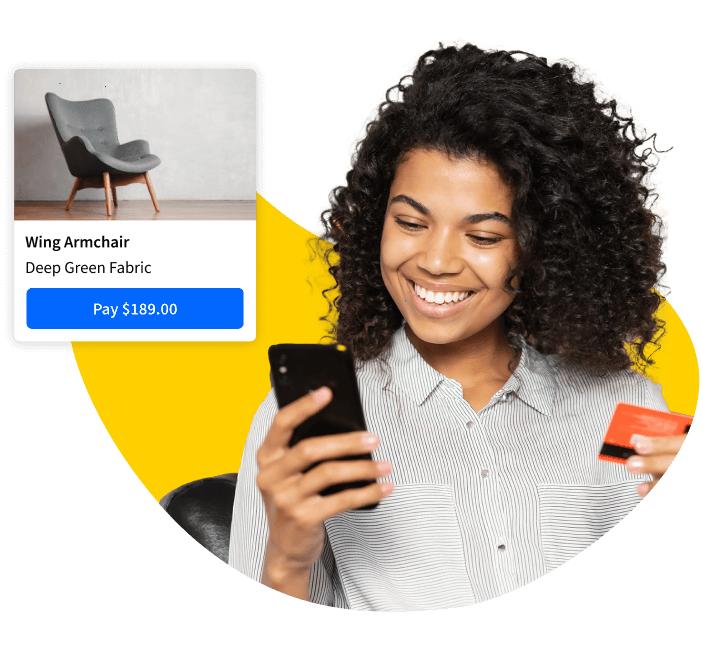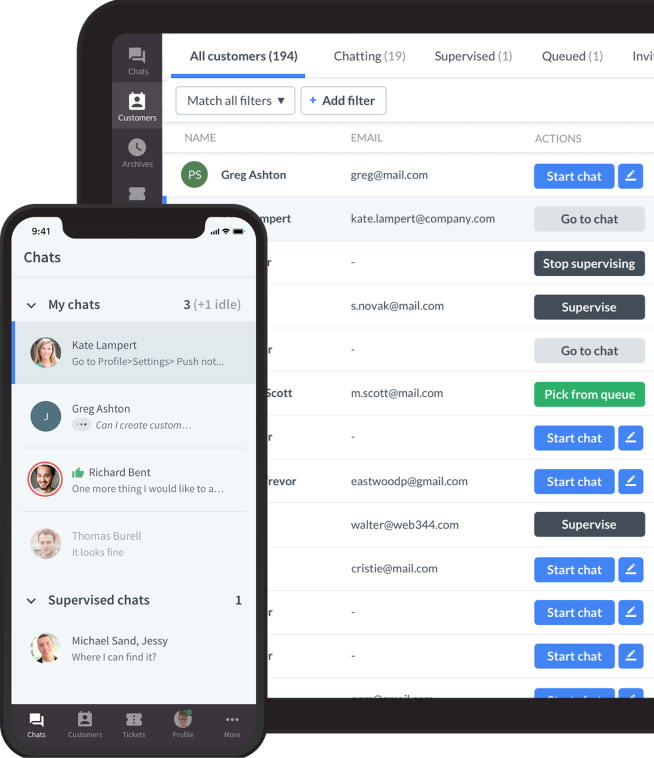Showing top 0 results 0 results found
Showing top 0 results 0 results found

Imagine this: you visit an online store, and instead of being greeted by a generic homepage, you're welcomed by a curated selection of products tailored precisely to your tastes and preferences. As you browse, each recommendation feels like it was handpicked just for you, based on your past purchases, browsing history, and even your demographic information.
This is the magic of ecommerce personalization in action. By customizing the shopping experience for each customer, businesses can elevate every interaction from mundane to memorable.
How can you do that?
The importance of personalization in ecommerce
Personalized ecommerce experience is a gateway to enhanced customer experiences. By catering to the unique needs and preferences of each shopper, you have the opportunity to create a seamless journey that feels intuitive and effortless. Whether it's offering personalized product recommendations, simplifying the checkout process, or providing targeted promotions, every touchpoint becomes an opportunity to delight and impress.
The benefits of personalization extend far beyond customer satisfaction
They translate directly into tangible business outcomes, driving increased sales and conversions. When customers feel seen and understood, they're more likely to engage with your brand, explore your offerings, and ultimately make a purchase. From tailored product suggestions to dynamic pricing strategies, personalization paves the way for higher conversion rates and a healthier bottom line.
Yet perhaps the most valuable payoff of ecommerce personalization lies in its ability to foster long-term customer loyalty. In a crowded marketplace where competitors are just a click away, building genuine connections with your audience is essential for sustainable growth.

You have the power to forge deep-seated bonds that transcend transactional relationships by consistently delivering a personalized shopping experience that resonates with individual shoppers. From personalized communications to exclusive rewards, every interaction becomes an opportunity to nurture loyalty and turn one-time buyers into lifelong advocates.
Benefits of ecommerce personalization
Increased conversion rates
You're browsing an ecommerce store, unsure of what to buy. Suddenly, you're presented with a selection of products that seem almost tailor-made for you. It's as if the website knows you better than you know yourself. This is the power of tailored product recommendations in action, and it's a proven driver of increased conversion rates.
When customers are presented with products that align closely with their interests and needs, they're far more likely to make a purchase. Whether it's suggesting complementary items to go with a recent purchase or highlighting trending products, personalized recommendations create a sense of relevance and urgency that can't be ignored.
Better customer experience
It's not just about driving sales—it's also about enhancing the overall customer experience. Imagine navigating a website where every step of your customer journey feels intuitive and personalized, from the moment you land on the homepage to the final checkout. Instead of sifting through endless pages of irrelevant products, you're guided seamlessly toward items that resonate with your tastes and preferences.
Personalized browsing and shopping journeys aren't just convenient—they're downright enjoyable. Using data insights to tailor the online experience to each individual customer, businesses can create a sense of connection and understanding that fosters loyalty and repeat business.
Higher average order value (AOV)
Let's not forget about the bottom line. Ecommerce personalization is one way to boost your AOV through relevant content, product suggestions, and upselling opportunities. Analyze customer data and understand their purchasing habits to identify strategic opportunities to suggest additional items that complement their existing purchases or upsell higher-value alternatives.

From recommending premium upgrades to bundling complementary products, personalized product suggestions can significantly impact AOV, driving incremental revenue and maximizing the value of each customer interaction.
Using customer data to your advantage
Ah, data, the lifeblood of modern ecommerce success. Let's dive into why harnessing the power of data collection and analysis is absolutely essential for unlocking the full potential of personalized online experiences.
Ecommerce personalization doesn't exist without data
Every click, every scroll, every purchase—each interaction with your ecommerce site paints an intricate picture of customer behavior. Use these types of interactions to gain a deeper understanding of your audience—their preferences, their habits, their pain points.
This knowledge forms the foundation of targeted ecommerce personalization, allowing you to tailor the online shopping experience to meet the unique needs of each individual customer.
Data collection is just the beginning
The real magic happens when you slice and dice your audience into distinct groups based on shared characteristics and behaviors. Segment your audience to create personalized marketing campaigns, targeted product recommendations, and tailored promotions that resonate with specific customer segments.

Whether it's first-time website visitors, loyal repeat customers, or bargain hunters on the lookout for a deal, segmentation allows you to deliver the right message to the right person at the right time.
Where does all this data come from?
From website analytics to purchase history to customer feedback, there's no shortage of valuable sources waiting to be tapped into:
- Website analytics provide a wealth of insights into how customers interact with your ecommerce website—what pages they visit, how long they stay, and where they drop off. Analyze this data to identify areas for improvement, optimize the user experience, and track the effectiveness of your personalization efforts.
- Purchase history is another goldmine of information, offering a window into customers' past buying behaviors, preferences, and product affinities. By understanding what customers have purchased in the past, you can make informed recommendations for future purchases, cross-sell related products, and tailor promotions to suit their interests.
- Customer feedback isn't to be missed. Gathering feedback directly from your customers through surveys, reviews, or social media comments is invaluable for understanding their needs and preferences. Listen to their feedback, address their concerns, and incorporate their suggestions into your personalization efforts to build stronger relationships and foster a sense of trust and loyalty.
Ecommerce personalization strategies
Ecommerce personalization strategies can take your ecommerce business from good to great. Here's a rundown of some tried-and-tested tactics to help you create tailored experiences that resonate with your customers:
Product recommendations
Imagine having a personal shopper at your fingertips, guiding you toward products you're sure to love. With personalized product recommendations, that dream becomes a reality. Analyze customers' on-site behavior and past purchases to curate a selection of products that align closely with each customer's interests and preferences. Whether it's showcasing related items on product pages or sending dynamic recommendations via email, personalized product suggestions are a powerful driver of engagement and conversions.
Continuous shopping experience
Ever added items to your cart on one device only to find them missing when you switch to another? Say goodbye to that frustration with a continuous shopping experience. You ensure a seamless journey from browsing to purchase by saving customer carts across devices. Couple that with a personalized homepage highlighting recently viewed items and email reminders to nudge online shoppers toward completing their purchase, and you have a recipe for conversion success.
Personalized promotions
Who doesn't love a good deal? With personalized promotions, you can sweeten the deal even further by offering discounts and offers tailored to each customer's behavior. Whether it's a special birthday discount, a limited-time offer based on past purchases, or exclusive perks for loyal customers, personalized promotions are a surefire way to drive customer engagement and incentivize repeat purchases.

User-generated content integration
Your customers are your best brand ambassadors, so why not let them do the talking? Integrate user-generated content like customer reviews and photos into your website to create a sense of authenticity and trust that resonates with prospective buyers. Encourage customers to share their experiences and showcase their purchases, turning your website into a vibrant community where shoppers can see real people enjoying your products.
Behavioral retargeting
Ever wondered how those ads seem to follow you around the internet? That's the magic of behavioral retargeting in action. Target ads based on past interactions with your website to re-engage inactive customers and nudge them toward making a purchase. Pair that with targeted email campaigns that remind customers of items left in their cart or highlight new arrivals based on their browsing history, and you have a powerful tool for driving conversions.
Dynamic content
One size doesn't fit all when it comes to website content. With dynamic personalized content, you can tailor your website experience to each user, ensuring every visit feels personalized and relevant. From personalized landing pages that greet customers by name to dynamic banners that showcase products based on their preferences, dynamic content allows you to create a truly immersive experience that keeps customers coming back for more.
Ecommerce personalization is about creating meaningful experiences that resonate with your customers on a personal level. Implement these personalized strategies to create a shopping experience that feels tailor-made for each customer, driving engagement, loyalty, and, ultimately, sales.
Ecommerce personalization best practices
Here's a rundown of some tried-and-true principles to help you navigate the ever-evolving landscape of personalized online experiences.
Segmentation
Think of segmentation as the secret sauce that makes personalization truly effective. By dividing your audience into distinct groups based on shared characteristics and behaviors, you can tailor your marketing efforts to speak directly to each segment's unique needs and preferences.
From demographics and previous purchases to browsing behavior and psychographic traits, there are countless ways to slice and dice your audience. The key is to identify the segmentation criteria that matter most to your business and use them to create targeted campaigns that resonate with each segment.
Continuous improvement
The only constant in ecommerce personalization is change. That's why it's crucial to adopt a mindset of continuous improvement. Regularly analyze data, monitor performance metrics, and solicit feedback from customers to identify areas for optimization and fine-tune your personalization tactics accordingly.
Also, refine your segmentation criteria, tweak your product recommendations, and experiment with new promotional strategies to stay agile and responsive to evolving customer needs and market trends.
User privacy
With great power comes great responsibility, especially when handling customer data. Ensuring data security and respecting customer privacy should be top priorities for any business engaged in ecommerce personalization. This means implementing robust security measures to protect sensitive customer information, obtaining explicit consent before collecting any personal data, and being transparent about how that data will be used. Prioritize user privacy and build trust with your customers to create a safe and secure online environment that encourages engagement and fosters long-term loyalty.
Following these best practices will help you maximize the effectiveness of your ecommerce personalization efforts and ensure that you're doing so in a way that respects your customer privacy and builds trust.
So remember, segmentation is your secret weapon, continuous improvement is your guiding principle, and user privacy is non-negotiable. Incorporate these best practices into your ecommerce personalization strategy, and you'll be well on your way to creating meaningful, memorable, and profitable online experiences.
Ecommerce personalization examples
What better way to illustrate the strategies and best practices than by discussing some real-world examples from brands we all know?
Amazon
Amazon is renowned for its sophisticated personalization tactics, such as its "Recommended for You" section, which offers tailored product recommendations based on browsing history, past orders, and demographic information. Additionally, Amazon utilizes dynamic pricing to show personalized discounts and offers to individual shoppers, maximizing conversion rates.
Netflix
Netflix curates a highly personalized content experience for each user. By analyzing viewing history, ratings, and viewing habits, Netflix provides tailored recommendations for movies and TV shows, ensuring that users discover content they're likely to enjoy.
Spotify
Spotify uses ecommerce product personalization to enhance the music streaming experience for its users. Through features like personalized playlists, recommended songs, and algorithmically generated playlists like "Discover Weekly" and "Release Radar," Spotify delivers a personalized music discovery experience that keeps users engaged and coming back for more.
Sephora
Sephora's Beauty Insider program offers personalized product recommendations, exclusive promotions, and birthday gifts tailored to each member's preferences and order history. Additionally, Sephora's mobile app allows users to scan products in-store, access personalized product recommendations, and view past purchases for a seamless omnichannel experience.
Nike
Nike's "NikePlus" loyalty program offers exclusive rewards, personalized product recommendations, and customized content based on customer preferences and activity levels. Nike's mobile app also utilizes geolocation technology to offer personalized in-store experiences and promotions based on the user's location.
The time to embrace ecommerce personalization is now
As consumers increasingly expect personalized experiences tailored to their unique needs and preferences, businesses that fail to adapt risk falling behind. Whether you're a small boutique or a global ecommerce giant, there's never been a better time to start implementing personalized strategies that elevate your online store above the competition.
So why wait? Seize the opportunity to connect with your customer base on a deeper level, drive conversions, and build long-term loyalty. The future of ecommerce is personalized, and the time to join the revolution is now.








Comments